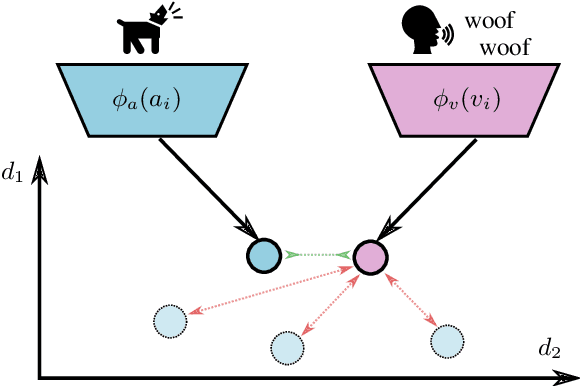Jonathan Greif
On Temporal Guidance and Iterative Refinement in Audio Source Separation
Jul 23, 2025Abstract:Spatial semantic segmentation of sound scenes (S5) involves the accurate identification of active sound classes and the precise separation of their sources from complex acoustic mixtures. Conventional systems rely on a two-stage pipeline - audio tagging followed by label-conditioned source separation - but are often constrained by the absence of fine-grained temporal information critical for effective separation. In this work, we address this limitation by introducing a novel approach for S5 that enhances the synergy between the event detection and source separation stages. Our key contributions are threefold. First, we fine-tune a pre-trained Transformer to detect active sound classes. Second, we utilize a separate instance of this fine-tuned Transformer to perform sound event detection (SED), providing the separation module with detailed, time-varying guidance. Third, we implement an iterative refinement mechanism that progressively enhances separation quality by recursively reusing the separator's output from previous iterations. These advancements lead to significant improvements in both audio tagging and source separation performance, as demonstrated by our system's second-place finish in Task 4 of the DCASE Challenge 2025. Our implementation and model checkpoints are available in our GitHub repository: https://github.com/theMoro/dcase25task4 .
Exploring Performance-Complexity Trade-Offs in Sound Event Detection
Mar 14, 2025Abstract:We target the problem of developing new low-complexity networks for the sound event detection task. Our goal is to meticulously analyze the performance-complexity trade-off, aiming to be competitive with the large state-of-the-art models, at a fraction of the computational requirements. We find that low-complexity convolutional models previously proposed for audio tagging can be effectively adapted for event detection (which requires frame-wise prediction) by adjusting convolutional strides, removing the global pooling, and, importantly, adding a sequence model before the (now frame-wise) classification heads. Systematic experiments reveal that the best choice for the sequence model type depends on which complexity metric is most important for the given application. We also investigate the impact of enhanced training strategies such as knowledge distillation. In the end, we show that combined with an optimized training strategy, we can reach event detection performance comparable to state-of-the-art transformers while requiring only around 5% of the parameters. We release all our pre-trained models and the code for reproducing this work to support future research in low-complexity sound event detection at https://github.com/theMoro/EfficientSED.
Improving Query-by-Vocal Imitation with Contrastive Learning and Audio Pretraining
Aug 21, 2024



Abstract:Query-by-Vocal Imitation (QBV) is about searching audio files within databases using vocal imitations created by the user's voice. Since most humans can effectively communicate sound concepts through voice, QBV offers the more intuitive and convenient approach compared to text-based search. To fully leverage QBV, developing robust audio feature representations for both the vocal imitation and the original sound is crucial. In this paper, we present a new system for QBV that utilizes the feature extraction capabilities of Convolutional Neural Networks pre-trained with large-scale general-purpose audio datasets. We integrate these pre-trained models into a dual encoder architecture and fine-tune them end-to-end using contrastive learning. A distinctive aspect of our proposed method is the fine-tuning strategy of pre-trained models using an adapted NT-Xent loss for contrastive learning, creating a shared embedding space for reference recordings and vocal imitations. The proposed system significantly enhances audio retrieval performance, establishing a new state of the art on both coarse- and fine-grained QBV tasks.
Multi-Iteration Multi-Stage Fine-Tuning of Transformers for Sound Event Detection with Heterogeneous Datasets
Jul 17, 2024Abstract:A central problem in building effective sound event detection systems is the lack of high-quality, strongly annotated sound event datasets. For this reason, Task 4 of the DCASE 2024 challenge proposes learning from two heterogeneous datasets, including audio clips labeled with varying annotation granularity and with different sets of possible events. We propose a multi-iteration, multi-stage procedure for fine-tuning Audio Spectrogram Transformers on the joint DESED and MAESTRO Real datasets. The first stage closely matches the baseline system setup and trains a CRNN model while keeping the pre-trained transformer model frozen. In the second stage, both CRNN and transformer are fine-tuned using heavily weighted self-supervised losses. After the second stage, we compute strong pseudo-labels for all audio clips in the training set using an ensemble of fine-tuned transformers. Then, in a second iteration, we repeat the two-stage training process and include a distillation loss based on the pseudo-labels, achieving a new single-model, state-of-the-art performance on the public evaluation set of DESED with a PSDS1 of 0.692. A single model and an ensemble, both based on our proposed training procedure, ranked first in Task 4 of the DCASE Challenge 2024.
 Add to Chrome
Add to Chrome Add to Firefox
Add to Firefox Add to Edge
Add to Edge